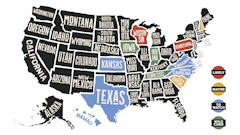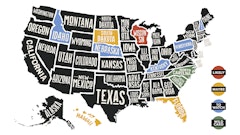
UPDATE: The Hawaii Senate voted, 19-6, to pass the adult-use legalization bill during its March 5 floor session, sending it to the House for consideration. Last year, Democratic House Speaker Scott Saiki refused to bring a previous legalization attempt to the floor for a vote.
The Hawaii Senate passed an adult-use cannabis legalization bill March 5—for the second straight year—following two committee approvals March 1.
The legislation, Senate Bill 3335, would allow adults 21 and older to purchase, transport and possess up to 1 ounce of cannabis flower or 5 grams of concentrate beginning Jan. 1, 2026, according to the bill. Adults would also be allowed to home cultivate up to six plants and store up to 10 ounces of dried flower from those plants in their homes.
In addition, S.B. 3335 would create a regulatory process for a commercial adult-use marketplace to include cultivators, processors, testing laboratories, microbusinesses and three types of retailers: adult-use and medical stores, and craft dispensaries, which could only distribute and dispense their own cannabis.
These provisions mirror a draft bill Democratic Attorney General Anne Lopez’s office sent lawmakers Jan. 5, when Lopez said in a public statement that her department does not support legalizing adult-use cannabis but that she considered it her duty to weigh the risks and provide a legal framework given the “changing public perception in recent years” and “the odds that the Legislature may pass legislation” this year.
Colorado and Washington pioneered adult-use cannabis legalization after voters passed respective initiatives in the November 2012 election, creating a ripple effect for reform in the years after. But Hawaii stood on the sideline during former Democratic Gov. David Ige’s tutelage from 2014 to 2022.
While Ige opposed legalization, his successor, Gov. Josh Green, said he’d support an adult-use cannabis program a month before his election. Green’s stance sparked the recent legislative attempts in the Senate, which, earlier this year, resulted in Hawaii’s attorney general providing a legalization proposal for lawmakers to work from.
S.B. 3335 passed the Senate Commerce and Consumer Protection Committee in a 4-0 vote and the Ways and Means Committee in a 7-5 vote on March 1. The full Senate passed the bill with a 19-6 vote on March 5.
The legislation’s sponsor, Democratic Sen. Jarrett Keohokalole, who also chairs the Commerce Committee, outlined three amendments to the 318-page bill prior to the former votes in a joint committee session last week.
- The bill now acknowledges certain distinctions between hemp and cannabis. Notably, a renamed Hawaii Hemp and Cannabis Authority would have the power to regulate all aspects of the plant, whether for medical, adult-use or hemp purposes.
- A criminal justice and rehabilitation provision was modified in the bill to allow individuals who have been previously convicted of a felony—where probation, incarceration or supervised release was completed more than 10 years ago—to apply for licenses and employment in the industry.
- The Department of Health’s responsibility was clarified regarding complaints about odors stemming from cannabis cultivation or use. While the Department of Health and its agents “shall examine into” all nuisances, foul or noxious odors, gases or vapors, S.B. 3335 states that a nuisance “does not include a hemp or cannabis product or any foul or noxious odor, gas, or vapor derived from a hemp or cannabis product."
“We are also blanking out the appropriation amounts and the position amounts in the bill to reflect the ongoing discussion going on at the Legislature right now,” Keohokalole said.
A 14% excise tax would be placed on adult-use cannabis sales, while, beginning Jan. 1, 2026, a 4% tax would continue to be levied on medical cannabis sales, according to the bill.
With the Senate's passage of S.B. 3335 on March 5, the chamber beat a March 7 crossover deadline to advance bills to the House.
Notably, Democratic Rep. David Tarnas introduced companion legislation, House Bill 2600, in January, but no committee hearings have taken place in the lower chamber.
Drug Policy Forum of Hawaii and other members of the Hawaii Alliance for Cannabis Reform "are hopeful that our proposed amendments" will be considered by the House Judiciary and Hawaiian Affairs Committee, which Tarnas chairs, said Nikos Leverenz, of the Drug Policy Forum of Hawai’i and the Hawai’i Health and Harm Reduction Center.
"It will also be important for reform advocates to engage skeptical members of the House, including many freshman lawmakers, who have placed far too much currency in the monotonous, less than fact-based rhetoric from the criminal legal lobby," Leverenz said in a statement provided to Cannabis Business Times.
While the Hawaii Senate passed a much shorter 56-page adult-use legalization bill last March, Democratic House Speaker Scott Saiki blocked its progress, saying at the time that various committee chairs should meet in the summer—after adjournment—to come up with a more comprehensive bill that “addresses the concerns that are always raised about marijuana use in Hawaii.”
Although Hawaii’s Constitution allows for special sessions to convene after adjournment by request of the governor or a two-thirds vote in the Legislature, Saiki’s plans to pick up adult-use legalization efforts last summer never materialized.
When Hawaii’s 2024 legislative session began in mid-January, the Senate listed cannabis legalization as a legislative priority, but the House did not. This divide between chambers comes despite Hawaii having one of the most partisan legislatures in the U.S., with Democrats owning all but two seats in the Senate and all but six seats in the House.
And while Hawaii has had a Democratic trifecta since December 2010, Green’s governorship is what helped ignite the current possibility of cannabis reform.
Under S.B. 3335, the Hawaii Hemp and Cannabis Authority with a five-member Cannabis Control Board would be responsible for licensing and overseeing a commercial adult-use marketplace.
Part of the board’s duties would be to establish a procedure by which licenses are awarded and to conduct or commission market studies to determine the maximum number of licenses that may be issued in the state marketplace. No person would be allowed to possess or have any direct or indirect interests in more than three licenses for each class of licensure, and no more than nine licenses total, according to the bill.
Licensed adult-use dispensaries would have to ensure an adequate product supply for medical cannabis patients as well as priority access or businesses hours, or both, for those patients, according to the bill.
Licensed adult-use cultivators would be allowed a maximum of 2,000 square feet of canopy for indoor grows and 5,000 square feet for outdoor grows, according to the bill.
The state’s regulatory agency would also be responsible for establishing a social equity program to provide grants to qualifying applicants.
State revenue from cannabis sales would be distributed equally into two special funds:
- Cannabis social equity, public health and education, and public safety; and
- Cannabis regulation, nuisance abatement, and law enforcement.
In addition, the legislation would create and fund a “cannabis enforcement unit” in the Department of Law Enforcement (DLE), which would be granted authority to prevent distribution to minors, drug trafficking, money laundering, diversion, and the use of firearms in cannabis cultivation and distribution, among other activities.
Still, the DLE submitted testimony opposing S.B. 3335, pointing to concerns of violent crime in California, where six people were killed earlier this year in a San Bernardino County desert community. The homicides appeared to have stemmed from a dispute over an unlicensed cannabis operation, NBC Los Angeles reported.
In the testimony, DLE wrote its members are “aware that illegal cannabis marketplaces continue to thrive in Hawaii despite Hawaii’s legitimate medical use and dispensary schemes. If cannabis becomes legalized for adult use in Hawaii as S.B. 3335 proposes, then the DLE fears that California’s experience with cannabis-related violent crime may establish a foothold in Hawaii and increase the risk of violence in the community.”
While the legislation will likely take on additional amendments, Democratic Sen. Tim Richards said March 1 during the Commerce Committee hearing that he thinks “we’re really close.”
“I’m going to be supporting with reservations just because I think we still got a little bit of tweaking to do, but I think we're close,” he said.

























